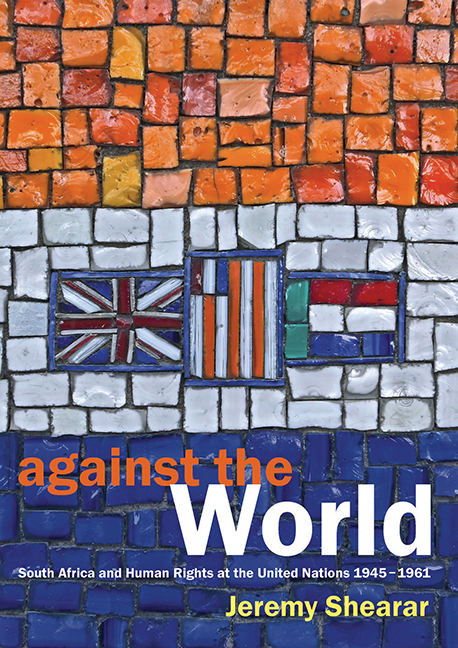Book contents
- Frontmatter
- Contents
- Acknowledgements
- Abbreviations
- Introduction: ‘What we have lost is all the more reason for cherishing what survives’
- 1 Quod severis metes: Birth of the United Nations
- Chapter 2 South African Indians
- 3 Universal Declaration of Human Rights
- 4 International covenants on human rights
- 5 United Nations surveys of human rights issues
- 6 Evolution of human rights at the United Nations
- 7 State sovereignty at issue
- 8 Apartheid on the agenda
- 9 Shadow of Sharpeville
- 10 General relations with the United Nations
- 11 Concluding observations
- Appendix: Selected provisions of the United Nations Charter
- Sources and references
- Index
3 - Universal Declaration of Human Rights
Published online by Cambridge University Press: 19 March 2020
- Frontmatter
- Contents
- Acknowledgements
- Abbreviations
- Introduction: ‘What we have lost is all the more reason for cherishing what survives’
- 1 Quod severis metes: Birth of the United Nations
- Chapter 2 South African Indians
- 3 Universal Declaration of Human Rights
- 4 International covenants on human rights
- 5 United Nations surveys of human rights issues
- 6 Evolution of human rights at the United Nations
- 7 State sovereignty at issue
- 8 Apartheid on the agenda
- 9 Shadow of Sharpeville
- 10 General relations with the United Nations
- 11 Concluding observations
- Appendix: Selected provisions of the United Nations Charter
- Sources and references
- Index
Summary
Commission on Human Rights
The Charter mentioned human rights and fundamental freedoms seven times. As they were not defined, the United Nations Preparatory Commission decided at its first session in London in December 1945 that a bill of rights should be drawn up. With the approval of the 1st GA, at its first session ECOSOC established an interim Commission on Human Rights (CHR), ‘consisting of a nucleus of 9 members appointed in their individual capacity’, their term of office to expire on 31 March 1947. Its competence included:
(a) Formulation of an international bill of rights;
(b) Formulation of recommendations for an international declaration or convention on such matters as civil liberties;
(c) Protection of minorities;
(d) Prevention of discrimination on grounds of race, sex, language or religion;
(e) Any matters within the field of human rights considered likely to impair the general welfare of friendly relations among nations (a later addition, possibly related to the GA's agenda item on the treatment of Indians in SA).
At the first session of the CHR the Assistant Secretary-General for Social Affairs, Henri Laugier, opened the discussions with the controversial comment that GA Res. 44(I) on the treatment of Indians in SA was proof that no violation of human rights could be covered up by the principle of national sovereignty. The Charter gave individuals and groups the belief that they had the right of appeal to the UN.
SA sent an observer to the meeting. He reported that the CHR was dealing with explosive topics and that some members approached the subject superficially. They were carried away by high-sounding ideals, forgetting to take practical issues into consideration. ‘If not handled correctly and with great judgement, [the CHR's efforts] may very well result in achieving the very opposite effect for which the United Nations was created’.
International bill of rights
The UK Foreign Office reported that the drafting committee established by the CHR had debated whether the bill of rights should take the form of a manifesto issued under cover of a GA resolution or whether it should be a convention with binding force. As the two proposals were not mutually exclusive, the drafting committee recommended that both paths be followed. It examined several drafts for a bill of rights, amongst which was the text on essential rights that Panama had submitted at UNCIO.
- Type
- Chapter
- Information
- Against the WorldSouth Africa and Human Rights at the United Nations 1945–1961, pp. 58 - 78Publisher: University of South AfricaPrint publication year: 2017



